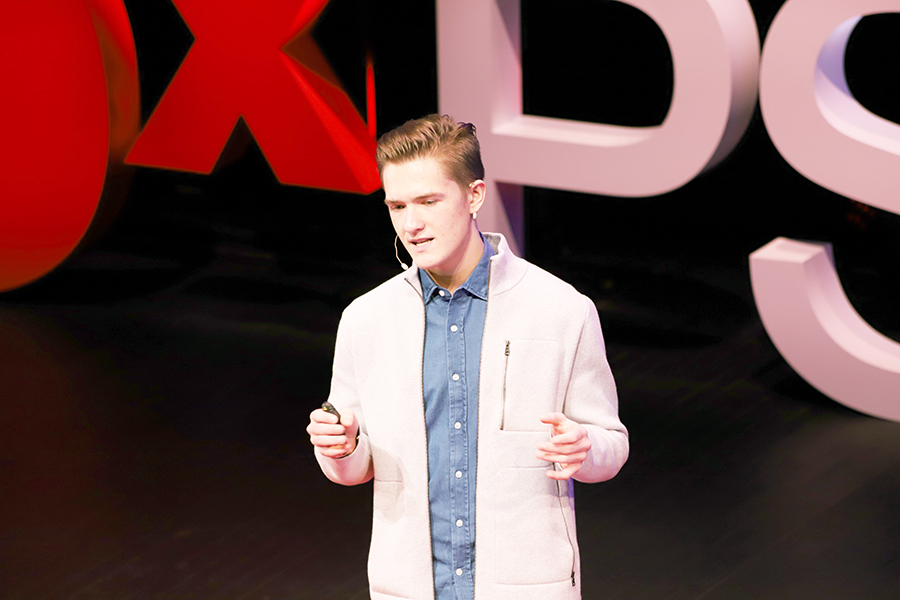Coach Carr from the movie “Mean Girls” stands in front of a chalkboard with the word “Abstinence” bolded and circled at the top. He begins his lecture to the bleacher-load of ambivalent high-schoolers, with this infamous first line: “Don’t have sex. ’Cause you will get pregnant and die.”
Satire aside, the sentiment could describe the majority of sexual education in the U.S. public-school system, which is abstinence-based.
Enter K.C. Miller, an openly gay 18-year-old senior at Westtown School in West Chester. He is proposing the legislation to update sexual education.
And Miller actually wrote the bill, called the PA Healthy Youth Act of 2017 would demolish abstinence-based education, requiring all federal funds received for sexual education to be channeled towards a comprehensive model that teaches medically accurate facts, information inclusive to all student populations and mutual understanding as the basis for any sexual interaction.
Miller has been interested in sex ed since, as a Westtown freshman, he and a group of senior girls created Sexual Health Awareness Educators, or SHAE, a peer-to-peer counseling group that meets bi-weekly.
“That was my entry point to bringing sexual education into my community, because I learned how much progress could be made just in those first few meetings,” he said.
That initial success sparked an idea for bigger plans.
“From starting this group, I realized that this kind of work really excites me and motivates me. With the political background I have — I started making calls for [the Obama campaign] when I was 8 — I started thinking: How can I weave my passion for sex education into my passion for politics?”
The changes Miller’s bill would bring to sex-ed curricula would be momentous for LGBTQ student populations, he said.
“Currently, you’ve got programs that stress that sex is between a man and a woman, that outwardly say homosexuality is a sin, that it’s wrong, that it’s shameful. These are actually funded, real programs in schools.”
Under the PA Healthy Youth Act’s model, all materials would be mandated to recognize different orientations and examples of same-sex relationships, and to address sexual assault and consent.
“In my conversations with people my age, they don’t understand consent,” said Miller. “I don’t think there is a huge amount of people out there who are purposefully violating those kinds of consent boundaries. That’s not to excuse their actions at all, but it is food for thought: If we equipped them with this info beforehand, how would they approach situations differently?”
Resistance to the bill mainly involves the LGBT components, Miller said.
“The most pushback I’ve gotten is against the LGBTQ community. “People — mostly Internet trolls — will say, ‘How dare we teach homosexuality in school? That’s a sin.”
Miller said he believes most communities want a medically accurate sex-ed curriculum.
“I think that undertone to my message really resonates with people.”
To bridge the gap between idea and law, Miller will have to do more than convince the religious right. For the bill to pass, it would require a state legislator to sponsor it.
Miller said he has a meeting with a state representative later this week, but he won’t name names just yet.
In the meantime, most of his work is awareness -focused: getting his name and his bill out in the public realm through media appearances, networking and social-media shares.
Miller’s 12-minute talk on the TEDxPSU stage in February got him 2,000 YouTube views and 3,200 on Facebook.
“The response was really fantastic,” he said. “And that’s how I connected with Jaime.”
After watching Miller’s Ted Talk, Jaime Winfree of Gwinnett Citizens for Comprehensive Sex Education, a kindred organization in Georgia, reached out. Their connection sparked the pending launch of a national advisory board to pass comprehensive sex ed.
“What we are trying to do is form a board that helps lead all our work nationally,” Miller said.
This week, he and Winfree will hold their first conference call with organizers from 10 other states.
Miller said that support from top organizers to grassroots volunteers will build momentum to pass the legislation.
“At the end of the day, I’m an 18-year-old senior in high school doing this out of my room, working a part-time job, and in school full-time,” Miller said. “So, I need help. I need people who are motivated and interested to get involved, because the more we work together and the stronger we are, the more we’ll change.”
